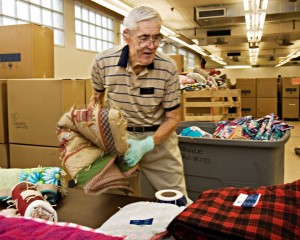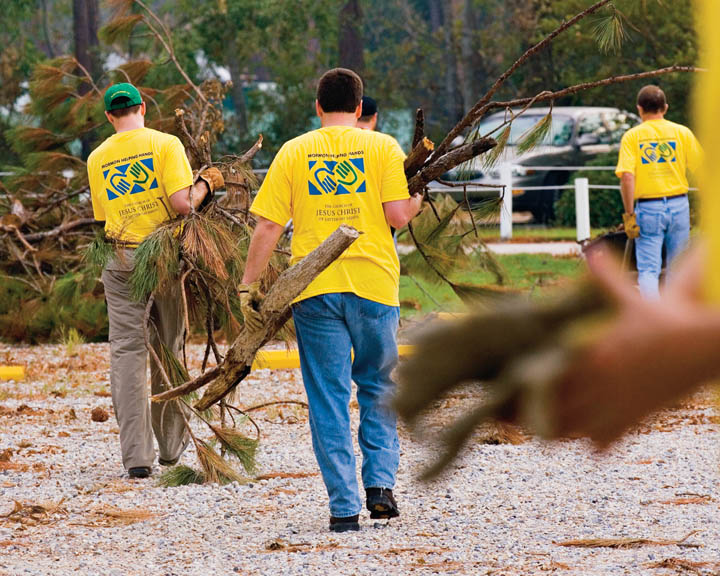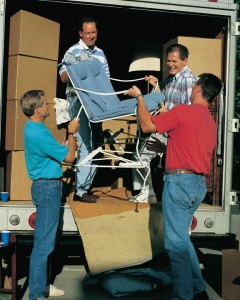 Members of The Church of Jesus Christ of Latter-day Saints, called “Mormons” by some, spend much of their time in church and community service. According to a recent survey reported on by The Pew Forum on Religion and Public Life, Mormons volunteer more of their time than any other group in America.
Members of The Church of Jesus Christ of Latter-day Saints, called “Mormons” by some, spend much of their time in church and community service. According to a recent survey reported on by The Pew Forum on Religion and Public Life, Mormons volunteer more of their time than any other group in America.
According to the research, which was conducted by Ram Cnaan of the University of Pennsylvania, about 30% to 50% of Americans report that they participate in volunteer service. Most who do volunteer spend, on average, about 3 or 4 hours a month. By contrast, committed Mormons participate in much higher levels of volunteerism. Cnaan and his colleagues found that an average Mormon spends 430 hours a year in church and community service, which is 8.2 hours a week or about 25 hours monthly, 6 to 8 times the amount the average American who volunteers contributes.
Mormons spend time serving in the church, in their neighborhoods among other members of their congregations, and in the community at large. Much of their time is spent in religious activities, but Mormons also spend significant amounts of time in community service outside their congregations. According to Cnaan,
For religious activities, [Mormons] give on average 242 hours [annually]. For church-affiliated volunteering to help meet social needs of people in the church, 96 hours. For church-affiliated activities helping people outside the church, 56 hours. And for activities outside of the church totally, 34 hours.
Mormon Church Service: Callings
One reason that Mormons spend so much time in volunteer service is that the Mormon Church utilizes a lay clergy. The “Bishop,” or clergyman for the congregation, is a volunteer who serves unpaid for a period of 5 or more years, supporting himself and his family by continuing to work at his profession during that time. In turn, members of the congregation accept “callings” from the Bishop to be teachers, clerks, youth leaders, etc. in the congregation. The Bishop seeks inspiration from God to know whom to ask to perform various callings, and members of the congregation almost invariably agree to do whatever the Bishop asks. In the Pew survey, 99% of callings were accepted. One experienced Bishop reported that he had been turned down only five times in eight years.
 Callings can be demanding, yet 86% of the Mormons surveyed reported having a church calling at the time of the survey. The researchers described the process this way:
Callings can be demanding, yet 86% of the Mormons surveyed reported having a church calling at the time of the survey. The researchers described the process this way:
Calling is a specific responsibility that a member of the church is asked to fulfill. A bishop or somebody of authority comes to a person, a member of the church, and says: You have a calling. This is a task that we want you to fulfill. It may go on for a few years. And usually, once you end a certain calling, you’re being asked for another calling…So almost all members of the church are expected to fulfill a calling. This is a culture that is very unique.
Members of The Church of Jesus Christ of Latter-day Saints also serve one another outside the avenues of their regular church callings. Mormons reach out to each other to provide for social, physical, emotional, and spiritual needs. Cnaan reports that he was very impressed by the service he witnessed:
When a Mormon leaves a place or comes to a new place, there’ll be members of the church helping load the car and members of the ward where this person is coming helping unload, providing food, assisting in coming. When somebody needs babysitting, there will be help…there is wonderful support, amazing support. I tell people a quick anecdote: I waited for a bishop in one of the wards (congregations). And a 17-year-old girl came to a person who sat next to me also waiting for the bishop and said to him…something like, do you know my uncle? And he said, yes, why? She said, he’s depressed now. Would you be willing to give him a call and cheer him up?
Mormon Humanitarian and Welfare Service: Helping the Poor and Needy
One other way in which Mormons serve is in care for the poor and needy, both within and without their congregations. They seek to follow the example of Jesus Christ in loving and relieving the suffering of those around them. Committed Mormons view caring for the poor and needy to be not just important, but essential to their religion, as reported by Greg Smith of the Pew Forum in a separate study:
Our survey finds that nearly three-quarters of Mormons say that working to help the poor and needy is an essential part of what it means to be a good Mormon. It’s not just an important part. It’s not just a nice thing to do. Helping the poor is essential to what it means to being a good Mormon.
I was struck by the number of Mormons who say working to help the poor and needy is essential to their religion. The number who say that is almost as high as the number who say it’s essential to believe that Joseph Smith actually saw God the Father and Jesus Christ.
 Mormons serve the poor and needy through humanitarian and welfare service. The Church’s humanitarian programs target victims of disaster and poverty worldwide with programs that administer emergency relief and also long-term aid with food, shelter, medical supplies, clean water initiatives, etc. The Church of Jesus Christ of Latter-day Saints also has a highly effective welfare program dating back to the time of the Great Depression. Members of the Church donate their time and resources to produce and purchase food, clothing, and other essential supplies. These are made available mostly to needy Church members, but also to others in need. Contributions made to the Church are sent to Church headquarters and then redistributed throughout the world.
Mormons serve the poor and needy through humanitarian and welfare service. The Church’s humanitarian programs target victims of disaster and poverty worldwide with programs that administer emergency relief and also long-term aid with food, shelter, medical supplies, clean water initiatives, etc. The Church of Jesus Christ of Latter-day Saints also has a highly effective welfare program dating back to the time of the Great Depression. Members of the Church donate their time and resources to produce and purchase food, clothing, and other essential supplies. These are made available mostly to needy Church members, but also to others in need. Contributions made to the Church are sent to Church headquarters and then redistributed throughout the world.
The Mormon religion lends itself to volunteerism of all kinds. By doing so, it blesses the lives of both Church members and members of the community at large. By forging strong bonds among themselves and reaching out to others, Mormons make huge contributions to the welfare of society as a whole.
Additional Resources:
The Pew Forum: Mormons and Civic Life

